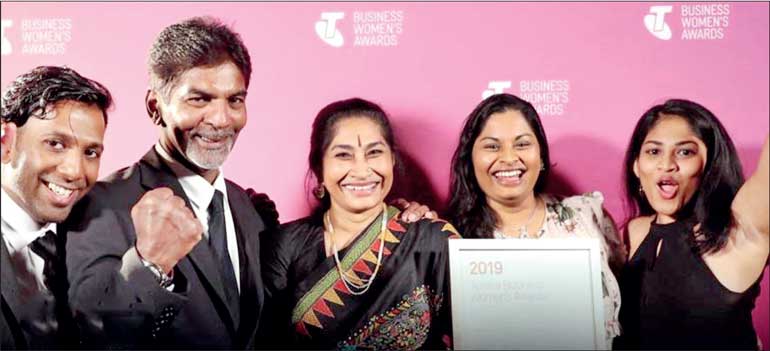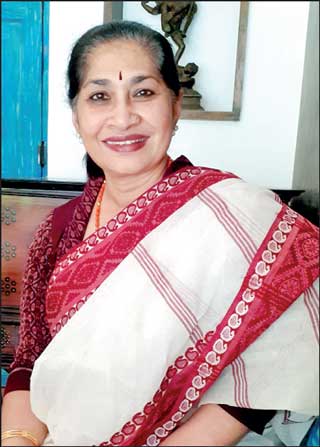Saturday Feb 21, 2026
Saturday Feb 21, 2026
Tuesday, 14 February 2023 00:20 - - {{hitsCtrl.values.hits}}

Jubilant Dushy at Telstra National Awards flanked by her husband, two daughters and son-in-law
|
Clinching Australia’s coveted Telstra Business Woman of the Year for Purpose and Social Enterprise in Queensland in March 2019, Dushyanthi (Dushy) Thangiah, in an emotionally-charged and inspiring speech recalled her beloved mother who lived by example that, “the joy in giving is much more powerful than the joy when we receive.” Nurtured in a family background of giving and sharing here in Sri Lanka, Dushy moved to Australia with her husband in the late 1980s where she turned tables.
A qualified management accountant by profession, Dushy was named the national award winner by Telstra in May 2019, out of 8,500 applicants, in recognition of her work as the CEO of Yumba-Meta Housing Association Limited (YMHAL). Meaning ‘home’ in both Aboriginal and Torres Strait Island languages, Yumba-Meta is a not-for-profit organisation established in 1973 providing secure and affordable accommodation and support services to disadvantaged people and the growing indigenous population of the Townsville region in Queensland, Australia.
The first Asian to be honoured with this prestigious award, Dushy personifies the Sri Lankan skill and the contribution of the immigrants to the Australian economy and social wellbeing. She was commended by the judges ‘as an exceptional and a collaborative leader who combines strong governance with humility and strength to make a tangible difference to her local community.’
Clad in a beautiful cotton sari, complemented with a pottu, Dushy was an embodiment of grace and elegance as she spoke to the Daily FT during her recent visit to her homeland, recapping what it took to make her the woman of substance and the perennial truth of Hindu teaching she is guided by: ‘the service to man is service to God’.
By Randima Attygalle
 |
| Dushy Thangiah a leader of grace and humility
|
With a twin-sister only nine minutes younger than she is, Dushyanthi (Dushy) Edwards’ friends and teachers at the Good Shepherd Convent Kandy had a hard time telling them apart. “That was so much fun and it is only when I went to the Science stream and my twin sister Githanjali, to the Arts stream that we separated,” recollects Dushy with a smile.
Deep cultural roots
Exposed to the best of both worlds – of the deeply rooted Hindu traditions and the Christian scriptures and the hymns at her convent school, Dushy grew up with three sisters in a Sri Lankan society of oneness when everyone was just an ‘aunty’ or an ‘uncle’ or a ‘friend’ and special food from each community was relished with delight. “It never occurred to us that we were Tamil and another was a Muslim or Sinhalese and I still cannot think of treating anyone differently. I’m still so close to my friends from all ethnicities and I just cannot comprehend the divisions which have sadly set in,” reflects Dushy.
The community leader credits her strong Sri Lankan cultural roots and her school days of order and discipline for shaping her to become the ‘community person’ that she is today, for becoming a voice for the voiceless. “My father’s job at the JEDB took us to various estates around the country and my mother who was so passionate about social service both within and outside the family inspired me from a very young age. Social service is in my DNA, probably that’s why it comes naturally to me.” Looking back, Dushy is grateful to the discipline which her boarding life at school instilled in her. “You learn to adjust a lot when you are boarding; you learn to get along with people from diverse backgrounds and this helps build skills. It also helps one to abide by rules and regulations very early in life.”
|
Finding a second home
With ethnic tensions setting in, following the 1983 communal riots and an insurgency in the horizon, newly married Dushy migrated to Australia in December, 1988 with her husband Ranjit Thangiah. Left bereft without her family, especially her twin-sister parting with whom she describes as “leaving half myself behind”, Dushy was heart-broken. Home-sick Dushy would keep on coming back to her homeland. Moving from Sydney to Townsville in Australia, Dushy would instantly feel at home, finding a ‘new extended family’ of grandmothers, aunts and uncles hanging around with the same kind of values she was accustomed to back at home. When she was pregnant with her second daughter, her newly found friends would cook for her and care for her compensating for her own family which she missed, to a large extent.
Looking back at her 28-year rewarding journey with Yumba-Meta Housing Association Limited, founded by Ernest Hoolihan, now into its 50th year, Dushy is nostalgic. Leaving behind a corporate job, Dushy first had a three-month trial period with the organisation, doing book-keeping. “I was the only Asian with Yumba-Meta back then and I was hesitant at the beginning with all the negativity in the press about the Aboriginal organisations. However, I gelled in so very well, so much so, there has never been a day that I didn’t feel like going to work,” says smiling Dushy who climbed up in ranks at Yumba-Meta not only to become its CEO but to bring its good work under the limelight by bagging several coveted Australian awards. “A leader’s hat is not something that one can wear and remove as one pleases, but one needs to live up to the expectations of a leader,” reflects Dushy.
|
Homelessness transcending cultures
Homelessness as Dushy points out, is a serious social problem in the developed part of the world although many would associate it largely with the developing and poor nations. The issue cuts across colour differences. “There are indigenous people, whites and migrants struggling without shelters, many live inside vehicles and what we do at Yumba-Meta is to break down barriers and allow all these people to live together.” Besides providing housing and support services, the organisation has evolved into a property developer as well. Any profit made by the organisation is invested back into the community to assist improve lives for vulnerable people. “First, we sit with people and try to understand the root causes which have driven them to be homeless. Unaffordable rents, domestic violence, drugs and alcohol abuse, disability and discrimination of various kinds make people helpless and homeless. Once people are put into transitional housing and their issues are stabilised, we find proper shelter – this is the principle on which we work.”
People’s person
Her ability to ‘connect with people’ which Dushy considers a blessing is what has driven her to achieve what she has. “Ninety percent of my work is to do with people’s skills. It’s important to have authenticity and compassion if you are to connect with people genuinely. The best lesson my 28 years at Yumba-Meta has taught me is that being you and only you without being a people-pleaser is going to take you a long way as people will appreciate you for it. My work has also taught me that no matter where you are, it is your character which is going to make a life for you and no one else could do it for you.”
Applauding her workplace for not just being a workplace, but a way of life, Dushy notes that supportive workplaces make empowered women and this empowerment enriches families in turn. “As a young mother, the support I got from my workplace was such that many assumed I was not a working mother, because I was so much involved in my children’s work.”
|
Championing people-centric solutions
Finding place-based, community-based solutions to social issues – be it homelessness or otherwise is critical if countries are to find sustainable answers, remarks Dushy. “Regardless of the country, if any organisation or a government is removed from grassroot realties, social change is not possible. If we look at the Sri Lankan context, what works for Colombo may not work for Jaffna or what works for Galle may not work for Batticaloa,” notes the community leader who maintains that in terms of Sri Lanka, the issues of resettlement in the North and East and reconciliation is possible only if social groups are galvanised.
“I don’t think this could be achieved politically; it is only through a collective social will that change is possible,” says Dushy who goes on to note that in this process, addressing the psychological dilemmas of those associated with war and displacement is critical. “This trauma is visible even in Sri Lankans who were forced to migrate due to war and horror; their hidden trauma is sometimes manifested in various other forms and it remains unaddressed and this is one area where we could harness the energy and talents of young people – to mould them into competent leaders who could empower future generations without carrying the baggage of the past horrors.”
|
Sri Lankan model of volunteering
Dushy who volunteers on eight boards in Australia draws enormous inspiration from the social structure of her beloved land of birth which she finds to be a distinct ‘model of volunteerism’. “I think in Sri Lanka what we do for each other in our communities is underestimated a lot. Although we may not label it as ‘volunteering’, the natural tendency of Sri Lankans to help one another is all about volunteering; we help our families, our neighbours in distress which we may take for granted. What we saw in Sri Lanka during the peak of COVID best illustrates this. Our people saw to it and nobody was left alone during lockdowns and this was just overwhelming.”
|
Putting behind biases
Proud of her small island which has braved so many catastrophes and horrors, Dushy remarks that this ability to endure has made us the most resilient nation in the world. “We have had one blow after another but we survived it all. It is this inner strength and unfailing faith which keeps us going. There is still so much goodness in our people which leaders should tap to help them reach their true potential. It is only if political leaders have the genuine intent of building their country that Sri Lanka could put behind biases of all kinds and move forward.”